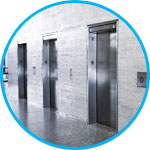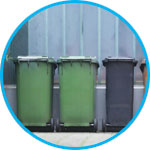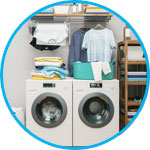Five steps to take if there is a COVID positive case in your strata property
By taking the right steps, you and your strata committee can help keep your strata community safe from a sizeable COVID-19 outbreak in your building
Has your strata property had to deal with a COVID positive case lately? With the Omicron variant in circulation all over the country, it’s easy for anyone, including those living in a strata property with shared common property, to catch the virus.
Community living has many benefits. However, living in such close proximity to others can mean a virus-like COVID may spread quickly if the situation isn’t managed well. That’s why it’s important to have a plan in place for dealing with COVID cases in your community living setting.
While much of this isn’t necessarily mandated by law, there are relatively simple extra steps you and your strata committee can take to keep everyone safe and healthy.
Is your strata property dealing with a COVID positive case? Here are 5 steps we recommend you take to keep your strata community safe:
- Ensure the COVID-positive person’s privacy is respected
- Check if the positive case needs assistance during their isolation period
- Contact owners, residents and contractors who may have been exposed
- Display a notice in common property areas
- Identify key risk areas and have them deep cleaned
1. Ensure the COVID-positive person’s privacy is respected
First and foremost, it’s important to ensure the privacy of any COVID positive owner or resident in your strata property is respected at all times. This means their name, unit number, contact details or any other personal details should not be shared unless your committee has explicit permission to do so.
2. Check if the positive case needs assistance during their isolation period
Isolating due to COVID-19 can be challenging. If someone in your strata property is COVID positive, they will likely need help with tasks such as getting groceries and disposing of rubbish.
Your strata community’s approach for dealing with positive cases could include a process for this. We recommend that the strata committee contact the owner or resident via email and check in with them to see if they need any assistance. Depending on what needs to be done, your strata committee could either engage a contractor to help with tasks such as rubbish disposal or additional cleaning, or a committee member could arrange to leave groceries outside their door if needed.
3. Contact owners, residents and contractors who may have been exposed
Because of the Omicron strain’s hyper-contagious nature, anyone who has been in contact with a COVID positive case should monitor for symptoms. It’s wise to ask the COVID positive individual/s to share a list of people in your strata community who should be contacted if they have physically interacted with their neighbour, the manager or a committee member in the building.
Anyone exposed to the COVID positive person will likely no longer need to isolate unless they too test positive for COVID or spent more than four hours in a home setting with them. However, it’s always best to check your state’s latest COVID guidelines.
- NSW: https://www.nsw.gov.au/covid-19/stay-safe/rules
- QLD: https://www.qld.gov.au/health/conditions/health-alerts/coronavirus-covid-19
- VIC: https://www.coronavirus.vic.gov.au/
4. Display a notice in common property areas
While it’s wise to alert everyone in your strata community if there is a COVID positive case, it’s important not to create any panic. After all, once the COVID positive person isolates, there is very little risk of them passing the virus on to anyone outside of their household. So, displaying a notice in common property areas is sufficient for alerting those who have had no contact with the COVID positive person.
To help you out with this, we’ve created a range of colourful COVID posters that includes one that alerts owners and residents of a COVID positive case. You can download this poster or the entire range for free here.
5. Identify key risk common property areas and have them deep cleaned
If you’ve had a COVID positive case in your strata property, it’s wise to identify areas where there may have been transmission and have them deep cleaned. It’s vital to find out which of these areas the positive case spent time in to prioritise cleaning them.
Key risk common property areas will differ between properties. They generally include:






We recommend speaking to your strata manager or facilities manager to organise a deep clean of the common property areas you deem to be high-risk. If you and your strata committee feel transmission in these areas are an ongoing risk, you have the option of increasing the cleaning schedule over the next few months.
You can also download our COVID cleaning poster here and have it displayed when cleaning is in progress.
COVID-19 will likely keep circulating in the immediate future. So, having a solid plan in place for dealing with COVID cases in your strata property may go a long way in reducing the risk of transmission within your strata community.
By taking steps like contacting anyone who may have been exposed, displaying a notice in common property areas, identifying key risk areas and having them deep cleaned every time there is a positive case in your strata property, you can rest assured knowing you have done your best to protect your strata community for the virus.
To access our full range of strata resources or to stay up to date on regular updates, sign up to receive our quarterly newsletter. For a consultation to review your by-laws, our Kemps Petersons Legal team is at your service to assist. Or, one of our team members can assist you with a free assessment – it’s free and carries no obligation.
